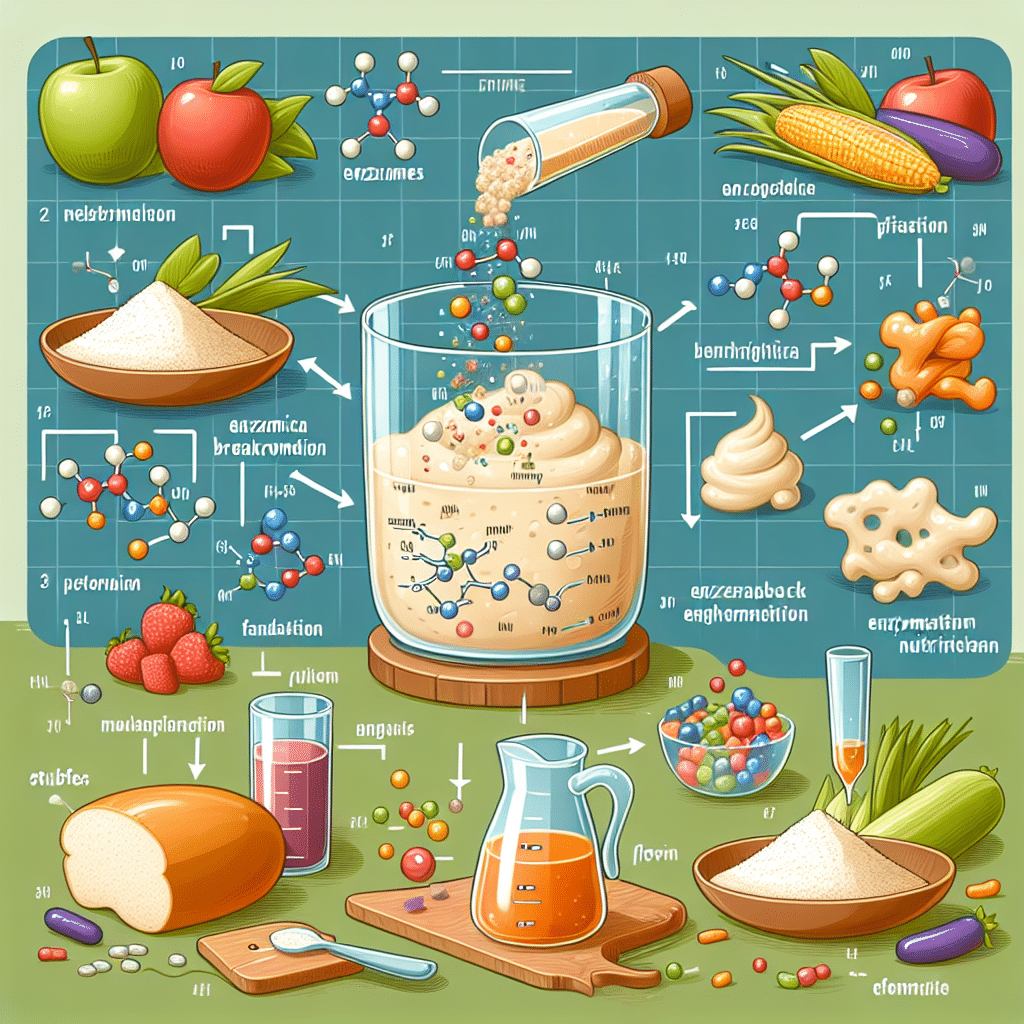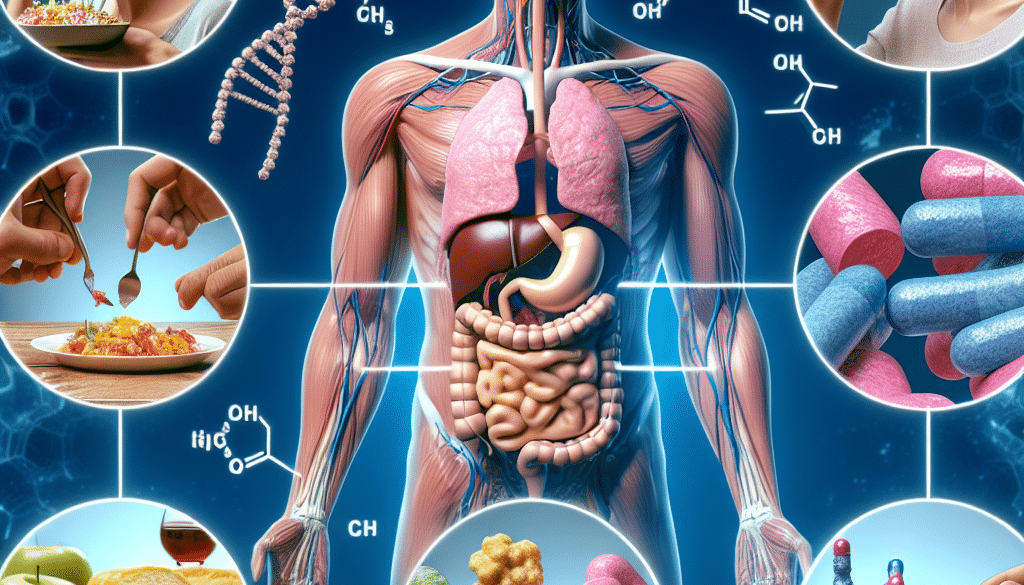The Role of Enzymes in Food
-
Table of Contents
- Enzymes in Food Processing: Enhancing Flavor, Texture, and Nutrition
- The Science of Enzymes in Food
- Enzymes and Food Flavor
- Improving Texture with Enzymes
- Nutritional Enhancement Through Enzymes
- Case Studies: Enzymes at Work in Food Processing
- Statistics: The Impact of Enzymes on the Food Industry
- Conclusion: The Indispensable Role of Enzymes
- Discover ETprotein’s High-Quality Protein Products
Enzymes in Food Processing: Enhancing Flavor, Texture, and Nutrition

Enzymes are nature’s catalysts, responsible for speeding up biochemical reactions in living organisms. In the context of food, enzymes play a pivotal role in transforming raw ingredients into the delicious and nutritious products that line our supermarket shelves. This article delves into the multifaceted role of enzymes in food processing, exploring how they enhance flavor, texture, and nutritional value, and why they are indispensable in the modern food industry.
The Science of Enzymes in Food
Enzymes are proteins that act as catalysts in biochemical reactions. They are highly specific, meaning each type of enzyme only catalyzes a particular reaction. In food processing, enzymes are used to break down complex molecules into simpler ones, which can lead to a variety of desirable outcomes, from tenderizing meats to clarifying fruit juices.
Enzymes and Food Flavor
One of the most noticeable impacts of enzymes on food is in the realm of flavor development. Enzymes can break down proteins, fats, and carbohydrates to release flavor compounds that enhance the taste of food. For example:
- Proteases: These enzymes break down proteins into amino acids and peptides, which can contribute to savory flavors, known as umami.
- Lipases: They target fats, releasing fatty acids that can add complexity to the flavors of cheeses and other fermented dairy products.
- Carbohydrases: These enzymes break down carbohydrates into sugars, which can sweeten fruits and vegetables or contribute to the browning reactions that develop flavor during baking and roasting.
Improving Texture with Enzymes
Enzymes also play a crucial role in modifying the texture of food products. They can be used to:
- Soften fruits and vegetables: Pectinase breaks down pectin, a structural component in plant cell walls, making fruit softer and easier to process.
- Enhance dough stability: Amylases break down starches in flour, helping to control the viscosity of dough and improve the texture of baked goods.
- Clarify beverages: Enzymes like proteases and pectinases are used to clarify wine and fruit juices by breaking down the proteins and pectins that cause cloudiness.
Nutritional Enhancement Through Enzymes
Enzymes can also increase the nutritional value of food by making certain nutrients more bioavailable. For instance:
- Phytases: These enzymes break down phytates in grains and seeds, which can bind minerals and reduce their absorption. By breaking down phytates, phytases increase the bioavailability of minerals like iron and zinc.
- Lactases: Lactase is used to break down lactose in milk, making dairy products more digestible for individuals with lactose intolerance.
- Proteases: By breaking down proteins into their constituent amino acids, proteases can enhance the nutritional profile of protein-rich foods, making them easier to digest.
Case Studies: Enzymes at Work in Food Processing
Real-world applications of enzymes in food processing provide insight into their transformative effects:
- Cheese Production: Rennet, containing the enzyme chymosin, is used to coagulate milk, separating it into curds and whey. This process is essential for cheese-making.
- Baking Industry: Amylases are added to flour to improve the fermentation process in bread-making, resulting in a better rise and a more desirable crust and crumb structure.
- Brewing: In beer production, enzymes break down starches into fermentable sugars, which are then converted into alcohol by yeast during fermentation.
Statistics: The Impact of Enzymes on the Food Industry
The use of enzymes in food processing is not only widespread but also growing. According to a report by Grand View Research, the global food enzymes market size was valued at USD 2.3 billion in 2020 and is expected to expand at a compound annual growth rate (CAGR) of 7.1% from 2021 to 2028. This growth is attributed to the increasing demand for processed food products and the need for improved food quality and sustainability.
Conclusion: The Indispensable Role of Enzymes
Enzymes are integral to the food industry, offering a natural and efficient way to enhance flavor, texture, and nutrition. Their specificity and ability to work under mild conditions make them ideal for a wide range of applications, from baking to brewing to cheese-making. As the demand for high-quality, nutritious, and sustainable food products continues to rise, the role of enzymes in food processing is set to become even more significant.
Discover ETprotein’s High-Quality Protein Products
If you’re looking for top-notch protein products that can complement the role of enzymes in food processing, ETprotein offers a range of options. Their organic bulk vegan proteins and L-(+)-Ergothioneine (EGT) are perfect for enhancing the nutritional profile of various food products. With a commitment to non-GMO, allergen-free ingredients, and high purity levels, ETprotein caters to industries including nutraceuticals, pharmaceuticals, and food and beverage. Explore their offerings to find the ideal protein solution for your needs.
About ETprotein:
ETprotein, a reputable protein and L-(+)-Ergothioneine (EGT) Chinese factory manufacturer and supplier, is renowned for producing, stocking, exporting, and delivering the highest quality organic bulk vegan proteins and L-(+)-Ergothioneine. They include Organic rice protein, clear rice protein, pea protein, clear pea protein, watermelon seed protein, pumpkin seed protein, sunflower seed protein, mung bean protein, peanut protein, and L-(+)-Ergothioneine EGT Pharmaceutical grade, L-(+)-Ergothioneine EGT food grade, L-(+)-Ergothioneine EGT cosmetic grade, L-(+)-Ergothioneine EGT reference grade and L-(+)-Ergothioneine EGT standard. Their offerings, characterized by a neutral taste, non-GMO, allergen-free attributes, with L-(+)-Ergothioneine purity over 98%, 99%, cater to a diverse range of industries. They serve nutraceutical, pharmaceutical, cosmeceutical, veterinary, as well as food and beverage finished product distributors, traders, and manufacturers across Europe, USA, Canada, Australia, Thailand, Japan, Korea, Brazil, and Chile, among others.
ETprotein specialization includes exporting and delivering tailor-made protein powder and finished nutritional supplements. Their extensive product range covers sectors like Food and Beverage, Sports Nutrition, Weight Management, Dietary Supplements, Health and Wellness Products, and Infant Formula, ensuring comprehensive solutions to meet all your protein needs.
As a trusted company by leading global food and beverage brands and Fortune 500 companies, ETprotein reinforces China’s reputation in the global arena. For more information or to sample their products, please contact them and email sales(at)ETprotein.com today.












